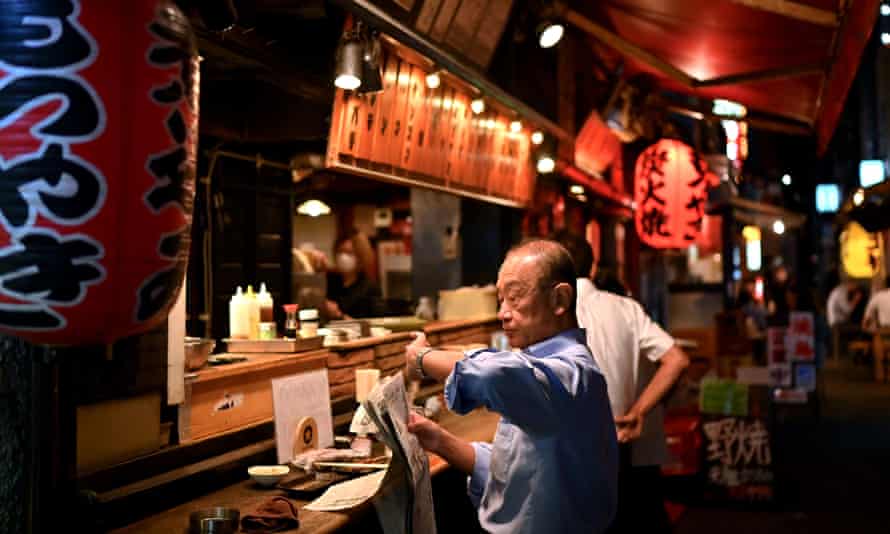A vivid rainbow heralds the arrival of dusk in Tokyo, but the fabled promise of a pot of gold must seem like a cruel joke to restaurateurs in Shimbashi, where office blocks stand in happy proximity to hundreds of watering holes.
In pre-coronavirus days, nightfall would be the cue for the neighbourhood’s neon lights to flicker into action and for touts armed with laminated menus to beckon office workers inside with promises of cheap food and drink.
But as Tokyo begins the fourth week of its latest coronavirus state of emergency, the usual post-work bonhomie that spills out on to Shimbashi’s narrow backstreets has been replaced by anger and despondency.
“Take a look … it’s empty,” says Yasuko Matsui, the owner of a small restaurant serving Nagasaki-style noodles. “We’re not allowed to serve alcohol, so no one is interested in eating out. Imagine going to a pub or restaurant where you can’t even order a drink.”
A ban on alcohol is one of several restrictions Tokyo’s eateries have been told to observe as the city attempts to arrest a fourth wave of Covid-19 infections, two months before it is due to host the Olympic Games. Even those that switch to serving only soft drinks must close at 8pm. As an incentive, the government is offering daily subsidies of between ¥40,000 (£258) and ¥200,000 (£1,292) depending on the establishment’s size, along with the threat of a ¥300,000 fine for noncompliance.
Even alfresco drinking is discouraged, with burly men in hi-vis jackets and baseball caps positioned on street corners to deter “displaced” carousers from congregating in a nearby park.

Japan’s third state of emergency, which targets Tokyo, Osaka and several other virus-hit prefectures, went into effect on 25 April and was supposed to end on 11 May, but has been extended until the end of the month.
While cases have fallen in recent days, infections remain stubbornly high, adding to concerns that the cycle of restrictions and periods of relative freedom – combined with a slow vaccine rollout – will fail to make a significant dent in the capital’s Covid-19 caseload.
Tokyo reported 732 cases on Tuesday – down from 925 the same day last week – bringing its total to more than 153,000, with almost 2,000 deaths.
Japanese health experts have long pointed to the heightened risk of Covid-19 transmission when groups of people sit in confined, poorly ventilated spaces and remove their masks to eat, drink and chat.
But for Shimbashi restaurateurs, the measures represent an existential threat. “The subsidies are too low, given that we can’t serve alcohol and have to close very early in the evening,” said Matsui, adding that her restaurant was “just about surviving” by offering special deals to the lunchtime office crowd.
Others complain that the subsidies don’t come close to matching the profits generated by alcohol sales. One bar owner, who asked not to be named, said his takings had fallen by about 60% since the start of the pandemic.
“We will probably be able to survive, but there are lots of smaller places around here that were encouraged by the government to take out loans earlier in the pandemic. Now they have to start paying them back, but they can’t. We are going to see a lot of places going bankrupt.”
Elsewhere in the neighbourhood, diners pack into the few restaurants that have decided to open up, while others display signs stating that they will remain closed until the end of the state of emergency. A small number look as if they will never reopen.
Their pain is being felt across Tokyo – whose endless gastronomic possibilities have helped earn it more Michelin stars than any other city in the world – and other parts of the country.
While sales at fast-food chains have grown during the pandemic thanks to higher demand for takeaways, those at bars and izakayas, a type of informal bar that serves drinks and snacks, plunged by almost 40% in March compared with the same month last year, according to the Japan Foodservice Association.
A report by Tokyo Shoko Research, a corporate analysis firm, says 842 restaurants nationwide filed for bankruptcy in 2020, up 5.3% from a year earlier. But it is at smaller izakaya pubs – a fixture of Japanese social and cultural life – where the virus is causing most damage. In the year through to the end of March, 175 went out of business – an annual rise of 17%, it said.
“People stayed away from pubs to avoid crowds,” the report said. “Small restaurants are also suffering from the cost of investing in equipment to prevent the spread of the virus, such as partitions.”
Global-Dining, a large restaurant chain based in Tokyo, is fighting back. It recently filed a suit seeking damages from the metropolitan government, claiming the order to close is illegal and infringes on its constitutional right to conduct business.
As the clock ticks towards 8pm – when her restaurant would normally be heaving – Matsui is preparing to lower the shutters after another evening of frustration. “We’re trapped in a vicious cycle and the politicians aren’t listening to us any more,” she said. “It feels like they have got their hands around our throats.”
This content first appear on the guardian
